If you’ve always longed to move at high speeds in a luxurious, maybe even showily-ostentatious and technology-packed panic room, but you hate gasoline and desperately want to rid yourself of $83,200, then holy crap is today a good day for you. That’s because BMW’s new electric SUV, the BWW iX xDrive50, exists, and feels like exactly whatever I just described. It’s an impressive EV, and I’m going to tell you all about it, like it or not.
(Full Disclosure: BMW flew me to Munich, former cradle of the National Socialist party and now just a lovely city, fed me, gave me booze, provided me with unlimited bidet access, and provided cars to drive.)
We may as well just get this out of the way right up front: this electric SUV is clearly targeted at the Tesla Model X. While it lacks the Model X’s overcomplicated Falcon Doors, I don’t think that will prove to be much of a barrier to people cross-shopping the two vehicles, and while there are some notable places where the iX falls short of the Tesla, there are many where it soundly comes out ahead. I think Tesla has a worthy adversary in the iX.
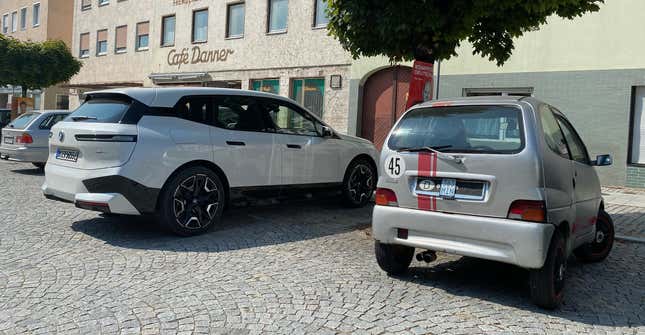
The iX (I’m not going to keep calling it the full official name, iX xDrive50, because that’s a cumbersome, goofball name that nobody is going to use, anyway, though I will promise not to pronounce it “icks” like the Germans do, so as to avoid comparisons to the SUVs made on the planet Richese) has some competitive specs. It makes 516 horsepower, does 0 to 62 mph in 4.6 seconds, and offers a range of about 300 miles (not official just yet in the U.S., but that’s the estimate, and fits with what I saw in use).
A Tesla Model X is roughly close in price (well, a good bit more expensive at $99,990), makes 670 hp, goes 360 miles per full charge, and goes from a stop to 60 mph in 3.8 seconds. The Tesla has the edge in all those numbers, but not by margins high enough to really make all that much real-world difference.
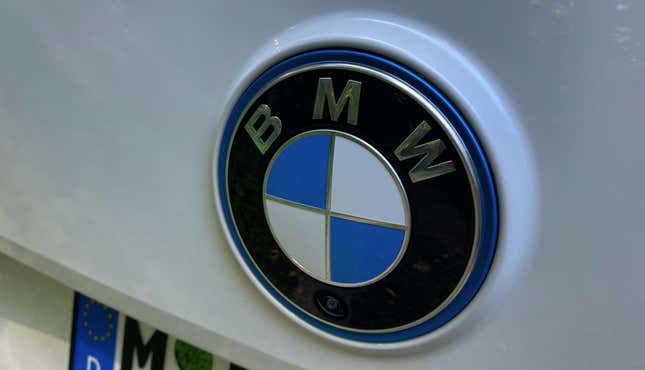
The BMW certainly has a build-quality advantage over the Model Xs I’ve been in, with everything inside and outside these SUVs feeling and looking extremely well-put together, and on the road the BMW feels like an absolute vault, quiet and solid and comfortable, with no loose bits of, well, anything, really.
The iX is a formidable machine, so let’s dig into it in more detail, starting with the looks.
Yes, THOSE looks
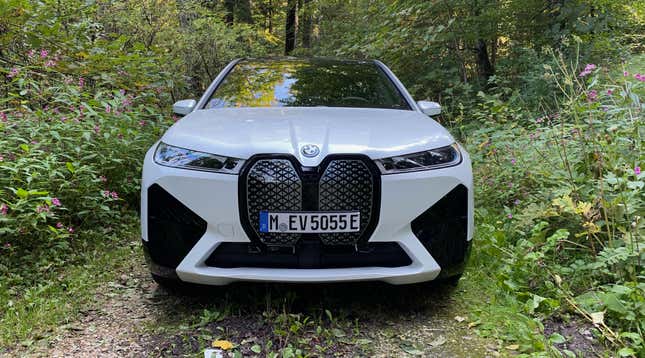
Okay, there’s no avoiding it, so let’s just look at this thing head-on and tackle it, well, head on: those massive kidney grilles.
I know for a lot of people the naked-mole-rat-like visage of recent BMWs, with their slitty eyes and massive nostrils, evokes feelings of terror and involuntary squirts of urine into absorbent trousers, but I have to be honest: the more I see it, the less it bothers me.
Now, I’m not sure if I’d call the iX an attractive car, at least not from the front—but it is a vehicle with a lot of interesting, clever, and even attractive design choices, full of arresting details and, from most angles other than the front, a clean, almost harmonious form, despite its considerable bulk.
Oh and before we leave the grille, it’s likely worth noting that it’s not actually a grille anymore—it’s really a pair of panels that house many of the car’s sensor-based systems.
Visually, I like the pattern used on the kidneys. They both suggest an old-school grille, but also don’t exactly ape the look of one, either. Also interesting about the kidneys is that, sort of like actual biological kidneys, they have a limited ability to self-heal.
I think this may be the first application of this sort of technology on a production car, but the surface of those kidneys is made with some kind of black-magic layered polyurethane that, if scratched (not gouged where material is lost, just scratched or dented) is capable of “healing” with the application of heat. Here’s the diagram journalists were shown:
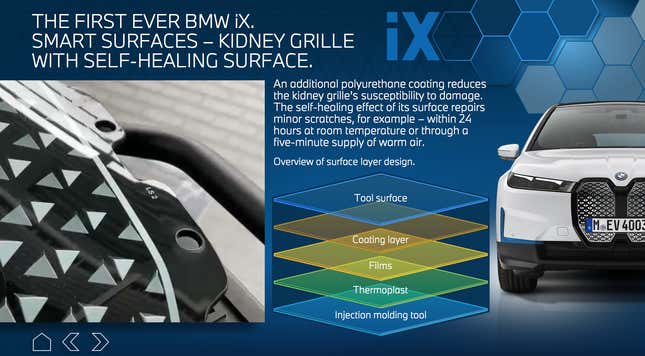
That’s pretty cool. Oh, and speaking of cool, when the weather outside is cool enough to form ice or snow, the kidneys have inset heating elements so that even if the front of the car is covered in snow or ice, the radar transceivers and other sensors behind the kidneys are still able to function, as they have their window areas melted clear:
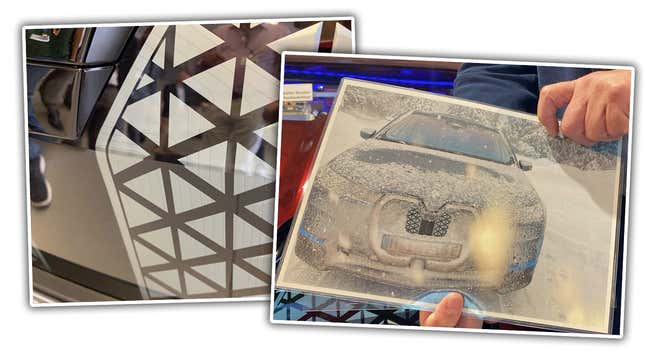
If we want our vehicles to rely more and more on sensors to assist us in driving, then this is exactly the sort of thing that needs to be incorporated into the design. The sensors have to be able to sense, after all.
Back to the looks. The iX is one of those cars that I think works best from a rear three-quarter angle, where you can appreciate the crisp character lines, and modern, sleek forms that work to minimize the iX’s size via judicious use of light and dark areas.
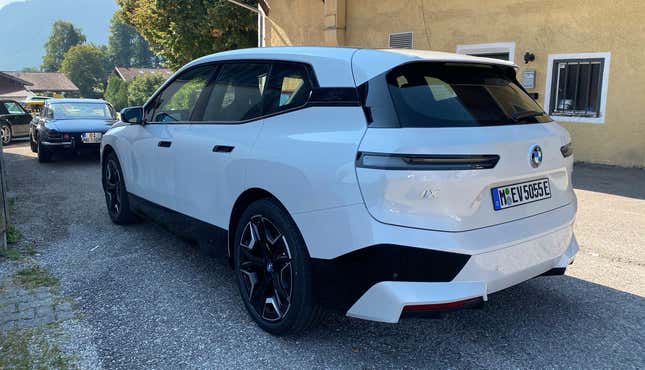
The proportions make the tall vehicle feel longer and lower than it actually is, with horizontal details also aiding on that front — things like the door handles, that bar on the D-pillar, and the long, thin taillights.
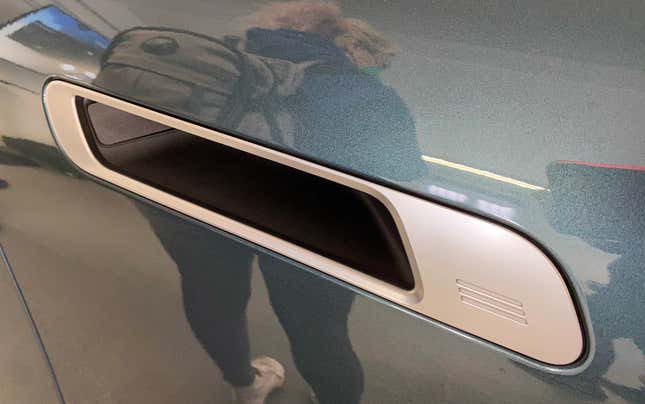
The door handles are nice; they are inset little cubbies that are easier to use and less gimmicky and complex than flush-mounted, power door handles that have to open and retract.
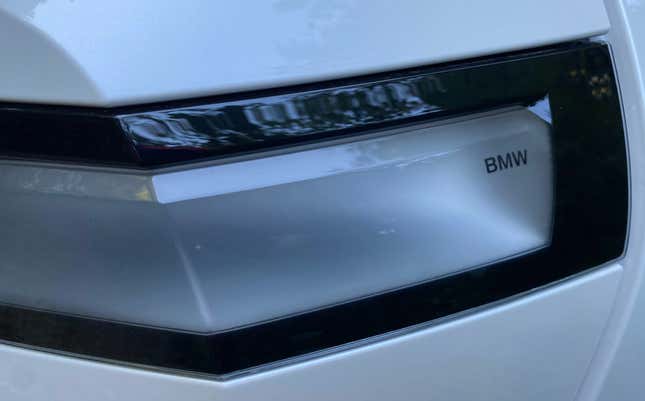
On some color combinations and trims, BMW has taken a bold approach to their taillights by making them an icy white when non-illuminated. I go back and forth on how I feel about non-red taillights in their dormant state, but in operation they’re plenty visible and clearly display their function, so I think this actually works well.
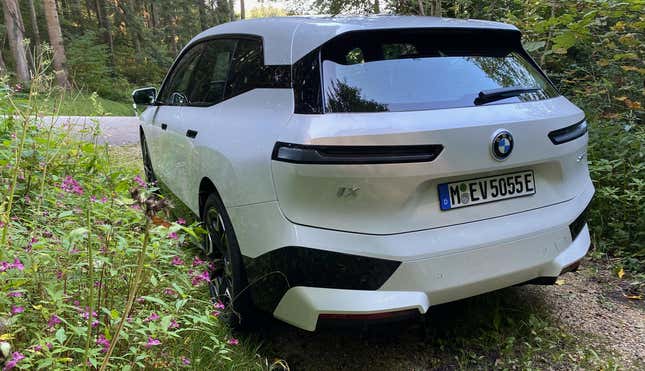
Even with that polarizing face, the iX has real presence when you’re near it, and that goes a long way. The white-and-black has a real Imperial Stormtrooper vibe to it that likely will appeal to a lot of people who are still bitter about the Battle of Yavin IV, but even without that association the black-and-white look is bold and appealing.
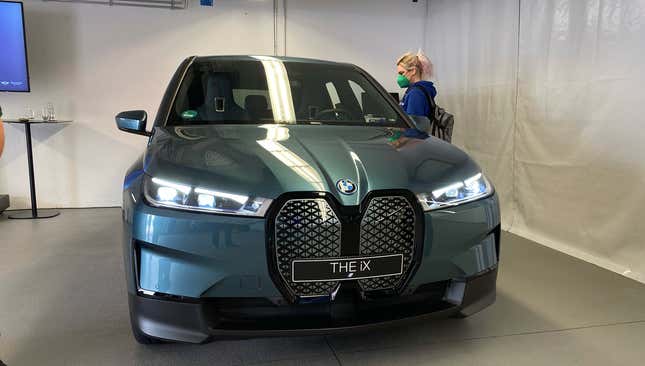
Black loses all the interesting details in its inky darkness, which is a real shame, as what works well about this car’s design has a lot to do with details and the contrast between the body color and black areas, but the good news is that there are some actual colors to be had, including a blue-green that’s quite nice.
Packaging And Tech
In this era of EVs, packaging is important, because part of the advantage of an EV is that, done properly, the amount of usable space for people and their cargo can be greater than in an ICE car.
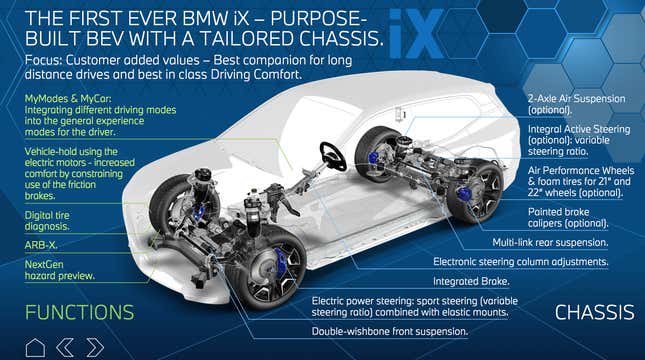
The iX does a lot of things right, and one significant thing wrong, I think.
The basic layout fits with the current battery-electric vehicle trends: a skateboard-style battery pack forming a big, flat floor, with motors mounted on or near each axle.
This opens up a lot of interior room, and gives a nice flat floor—I’ll get into that a bit more when I talk about the interior.
But, like some other German battery-electric vehicles I could mention, the BMW iX doesn’t see fit to provide any storage up front, a decision that I can’t help but feel is a bit lazy.
I say this because so many other EV makers have figured out how to provide some sort of useful front trunk: Tesla, Rivian, Ford, Volvo/Polestar, and more. Hell, BMW did it with its i3 electric car. Would it have killed the company to try to package things a bit tighter under that front hood?
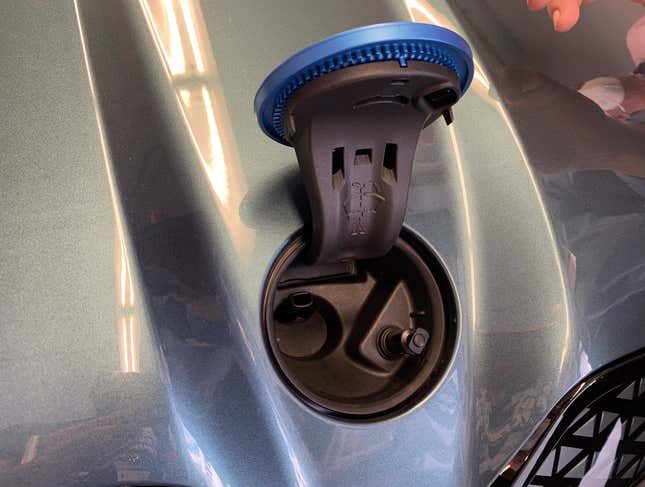
That front hood, by the way, is weird. Normally, all you can open in the front is the BMW badge, which gives access to the washer fluid reservoir and a bit of cargo room, provided your cargo is one solitary meatball wrapped in a napkin.
The hood itself can be opened, but it’s a bit of a chore involving two separate latches, and there are no stays or even one of those hinged sticks to hold the hood open; this is clearly a no user-serviceable parts inside kind of deal.
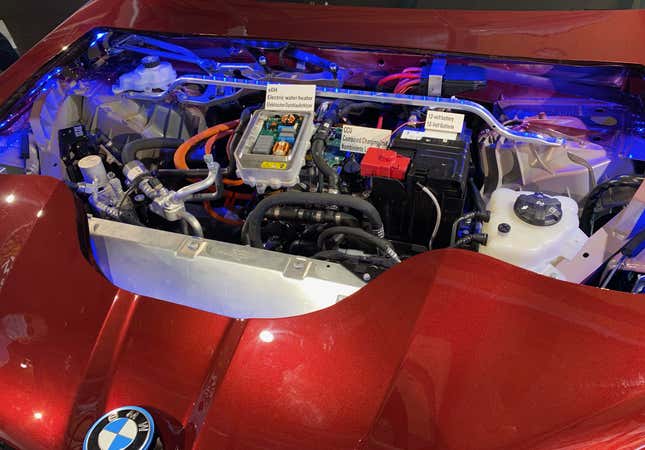
I scrutinized the under-hood components in the cutaway iX that BMW thoughtfully provided for us, and I think, with just a little bit of re-organizing and re-packaging, the iX could have had a wide, usable front storage compartment about four to six inches deep—plenty of room for charging cables or laptop bags or blankets or whatever.
They could have done it, I think, and, no, I’m not backing off of this. The bar has been set: modern EVs can have storage at both ends, and if one doesn’t, it’s not the end of the world, but it’s worth calling out.
The flat battery skateboard does have a significant lump that forms the base of the back seat, and inside that lump is the battery management unit and associated hardware.
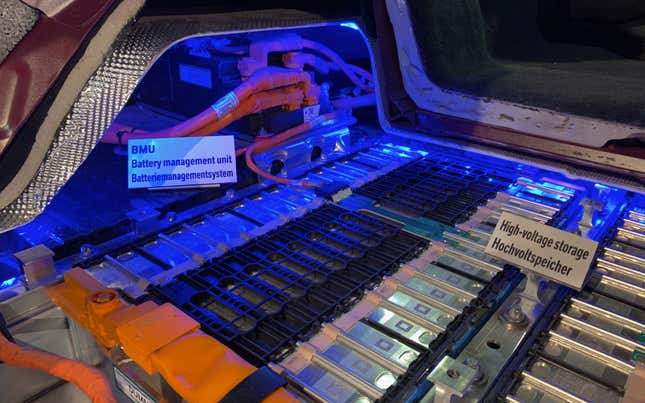
This is a less-integrated setup than Tesla uses, and while it may be a bit less space efficient, it should be more serviceable than Tesla’s extremely tightly integrated battery and associated electronics, which is a good thing, and worth having a lump — one that you’re just sitting on, anyway.
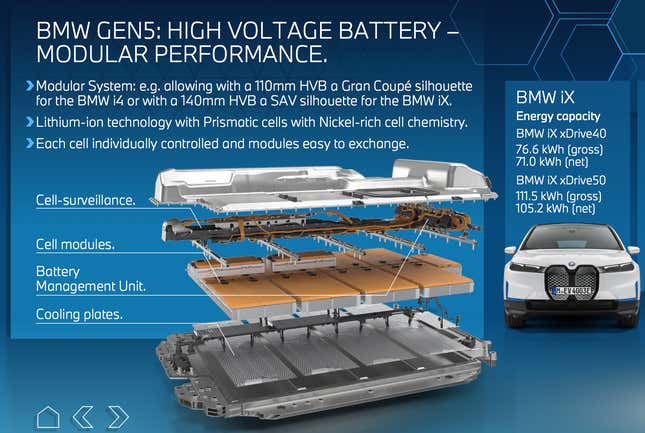
The battery pack uses prismatic cells grouped into modules that can be individually removed and replaced. Tesla uses cylindrical cells with a sophisticated internal cooling setup, and while those are grouped into large modules, the process of module replacement is difficult and expensive. BMW claims their more modular approach makes module replacement relatively easy.
The more modular approach used by BMW is similar to how Polestar is approaching battery packs as well, and is trending towards becoming an informal standard. We’ll have to see, but anything that helps prevent total monolithic battery pack replacements for servicing is a good thing.
The battery pack stores a total of 111.5 kWh, with 106.3 kWh (I know the chart says different, but BMW gave me that number) actually usable. For comparison, a Tesla Model X battery pack stores 100 kWh, so they’re really pretty close there.
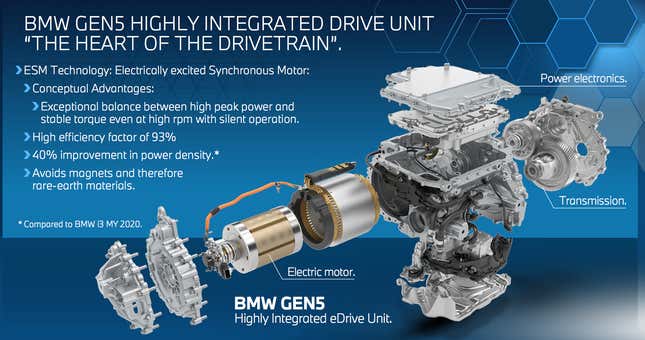
BMW is very proud of its new eDrive unit, which the company says much more tightly integrates its motor and transmission than previous BMW drive units. Bavarian Motor Works says a the drivetrain has a 40 percent higher power density when compared to that of the BMW i3.
It’s an impressive unit that doesn’t use rare-earth metals, a choice that BMW made to try to build the vehicle as sustainably as possible. I’ll talk about this initiative more in a bit.
What’s Inside the Inside
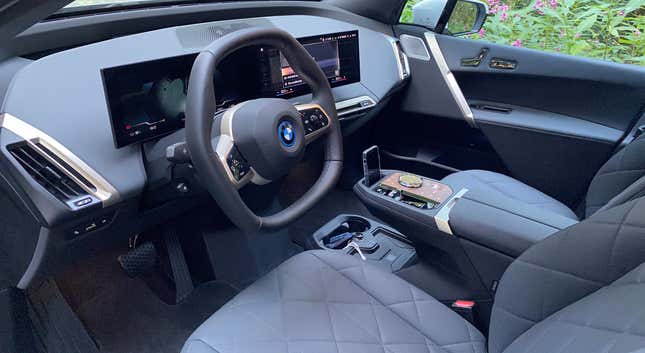
I realize that most of your time inside the car won’t be sandwiched into that battery pack, but will be above it, in the body, where all the VIPs hang out. And that’s a good thing, because the iX’s interior is iXcellent. Ugh, why did I type that? I’m going to leave it in as a lesson to myself, but I’m so sorry.
Stupid wordplay aside, the materials and build quality and overall clean, minimal-yet-not-too-minimal design aesthetic of the interior are all absolutely top-notch. It even smells good.
There’s a variety of interior material options available, most from sustainable and recycled sources, and everything feels very premium to the touch. So much so that I was constantly feeling a vague sense that in a few moments someone would clock who I actually was and politely but firmly ask me to leave.
Now, some of the materials you can select for your various controls are, um, what’s the right way to say this? Ridiculous. Like the optional crystalline controls:
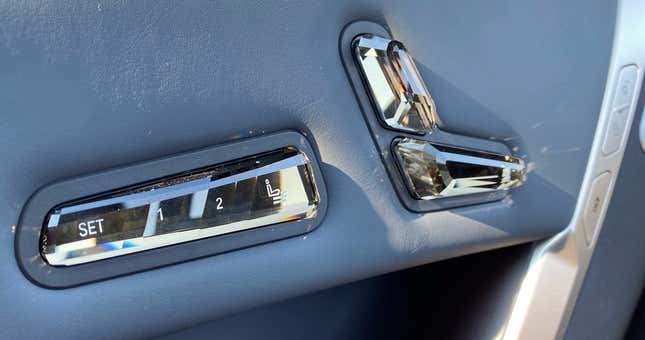
These are absurd. But, that’s not necessarily a bad thing. Cars have never been entirely rational things, and hopefully, never will be. If someone likes the look and feel of faux crystal seatback and other physical controls, then, buddy, have at it. BMW will happily give you all the fancy-ass crystals you can fondle in the iX.
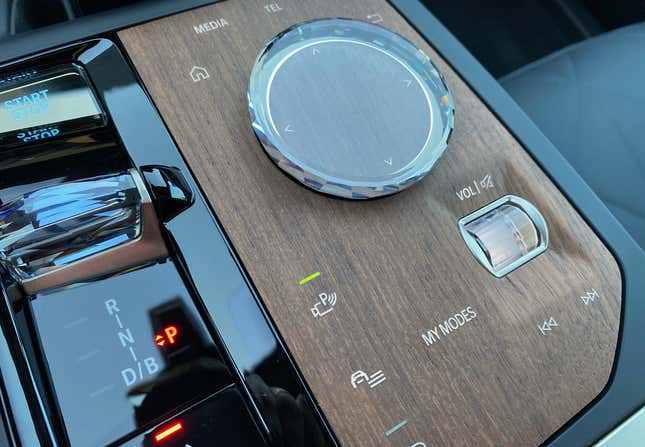
Sure, they seem silly and ostentatious, but it’s hardly the first time a luxury car has employed the ethereal magick of crystals. This is just a thing some people like, and I’m not going to spoil that for anyone. Remember, I don’t kink-shame.
I did actually notice some annoying light reflections from the seat-adjustment crystals on the door that looked to my peripheral vision like an emergency vehicles’ light while I was driving on the Autobahn, which isn’t great. There’s other material options if this is a concern.
The dash layout, with its wide, curving instrument/center stack screen is actually quite legible and usable, and I’ll cover that more when we talk about the tech.
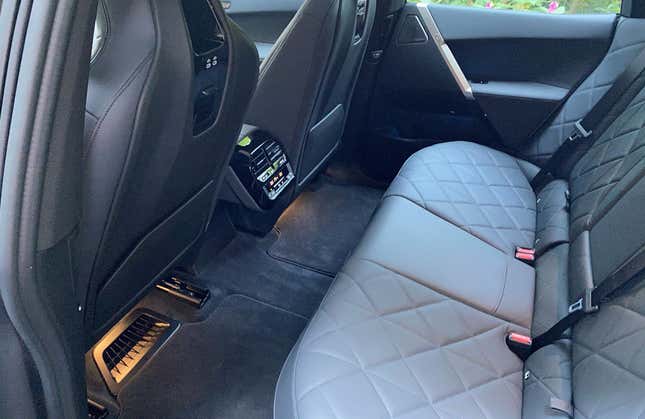
The rear passengers enjoy a completely flat floor and plenty of legroom, along with their own climate controls. The seatbacks have a pair of USB-C ports each, along with a rectangular-shaped “socket” that BMW said would be used for accessories, though they didn’t elaborate as to what.
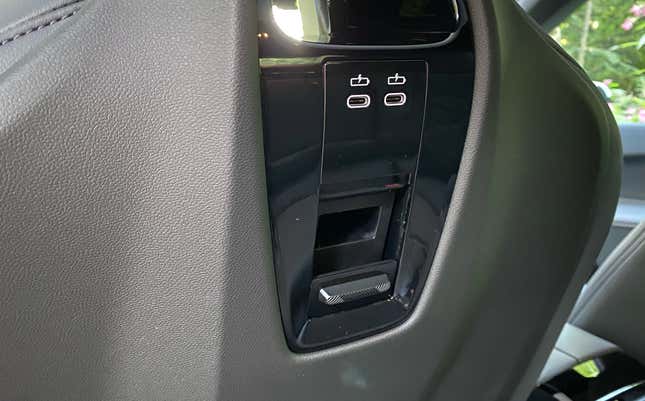
Screens? Trays? Basketball hoops? Who knows.
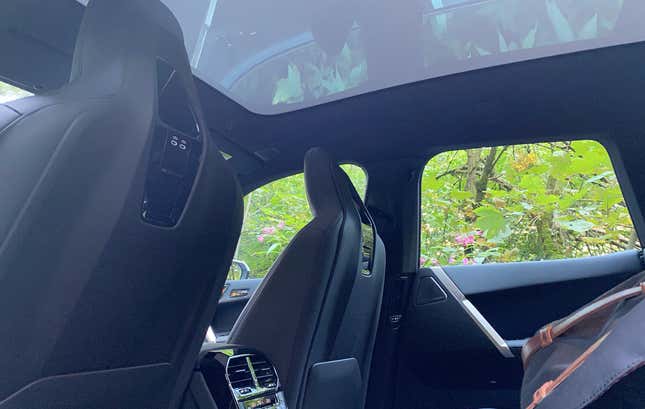
The cabin feels open and airy, thanks in part to the varied colors of the materials and relative minimalism, and in part to the large glass roof.
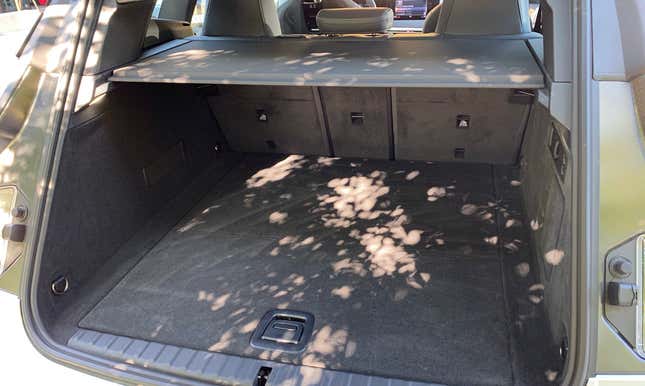
The cargo area is a good size, and includes a pair of supplemental taillights in the clamshell hatch’s frame so you can drive with the tailgate up to accommodate your baby giraffe and lawnmowers back there. I thought I had a picture of the redundant taillights but somehow I can’t find the thing, an error that horrifies me.
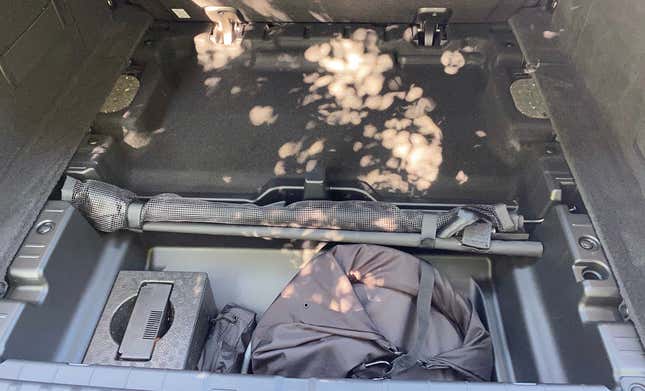
Under the cargo area floor is a generous hidden trunk, going back the full length of the floor and having room for the charging equipment. Of course, to get to the charging cable or tire inflation equipment with luggage back there, you’d have to move everything out of the way, which could have been avoided if certain engineers from a certain Bavarian carmaker decided to give a damn about packaging some room up front, but whatever, nobody asked me.
The interior is just fantastic overall, and is a wonderful place to sit and spend time. That said, I do have one significant ergonomic complaint, and it has to do with the front seat cupholders.
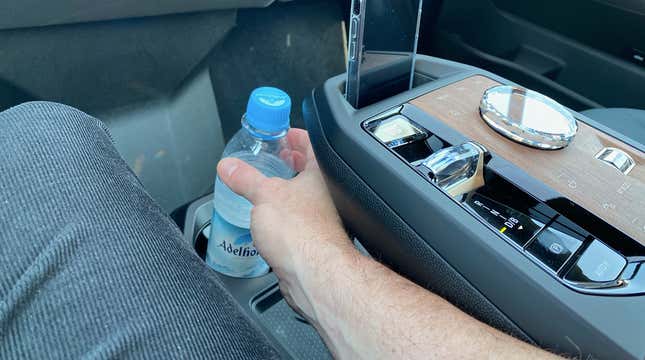
I have no idea why BMW decided to do it this way, but the center console has a two-tiered design, and the cupholders are set on the lower tier. This means that when you reach for your drink, your hand will be partially trapped by the upper tier, which makes getting the beverage in and out needlessly awkward.
I asked a BMW rep about this, but they insisted they had no issues taking bottles or cups out of there at all, which could be true. Maybe they have more flexible forearms than I do, or something. I think it’s poorly considered, and could be fixed by just moving the cupholders forward a few inches.
You’ll Never Accidentally Miss Another Exit Again
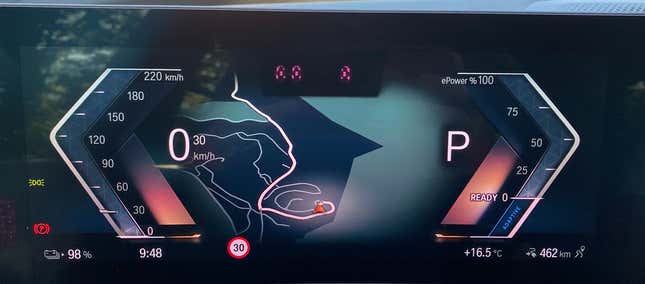
BMW is quite proud of all the tech they’ve crammed into the iX, and I get that—the electronic candy is a big draw for people looking for vehicles like this, and I think BMW has executed it well.
There’s all the expected modern-car stuff — big LCD screens and Apple CarPlay/Android Auto, over-the-air updates, the whole suite of driver assist features including a Level 2 semi-automated driving assist system, heads-up display, nav, satellite radio, on and on. You’re not going to be missing anything.
There’s some standout stuff here, too — I already mentioned the novel parking-record-and-playback feature, but I think my favorite feature was a UX addition to the navigation system, one I haven’t seen on any other car before, and one that is genuinely useful.
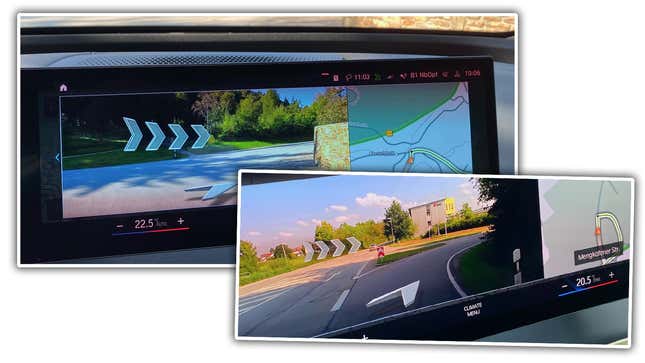
I think BMW calls it something like Augmented Reality view, and it’s an enhancement to the navigation interface that takes a live video feed from the (pretty high-resolution) forward-facing camera and superimposes three-dimensional arrows and direction guides over the image.
When I was driving through unfamiliar German cities, this was a huge help. As a lifelong idiot, I often will take the wrong turn while following GPS directions because I turned too soon or too late on roads that just weren’t that clear on the map.
The augmented reality camera view makes everything really, really obvious, even for an idiot like me. See what’s out the windshield there? That’s exactly what’s on the screen, only with big, obvious arrows saying hey, turn here, right here, not the small street just a few feet before this, but here, where the big arrow is pointing.
I loved this system, and found it incredibly effective.
Park Assist That Helps You Avoid Door-Dinging Another Car
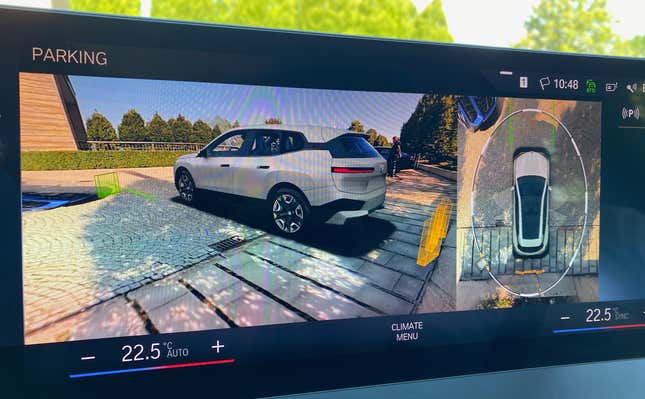
There’s also a strange but kind of fun parking-assist option that superimposes a 3D model of the SUV over the fused camera views, giving you the ability to see the car as though you were floating outside it, astral projection-style. I especially like that the model car’s taillights work, just as your real ones do.
Oh! And you know what else it does that’s very useful? Look at the overhead view of the car on the right side of the screen up there. Can you see that by each door, the arc of how far the door will swing out is shown? That’s a really handy thing to have in tight parking places, so you won’t accidentally whack your door into the car next to you—or, if you do, at least you can really plan it now.
There are a few unexpected features, too. Like the selfie camera.
The Selfie Camera
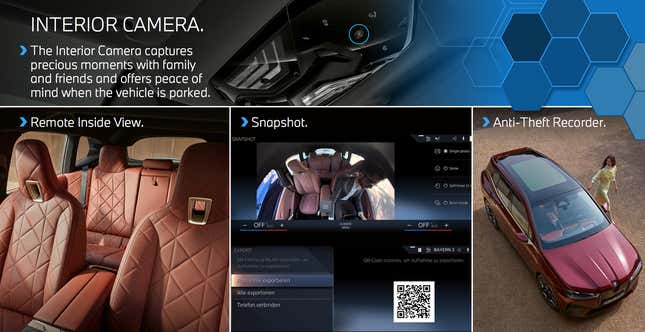
On the surface, it seems pretty silly; you can use the interior camera to take a selfie of you, in the car, via a fisheye lens, all from a voice command if you really wanted to — a desire I’m having a bit of trouble relating to.
But, this makes more sense when you realize you can use this same interior snapshot feature remotely from your phone, so if you can’t remember if, say, you left the dog in the car, you can have a snapshot sent right to your phone so you know if you’re a terrible pet owner or not. I imagine this would also work for things like jackets and wallets and insulin or whatever.
BMW did go out of its way to point out that the images are sent directly and securely to your phone and are not stored on any of the company’s servers, so this should hopefully mitigate this feature becoming a tool for stalkers.
BMW’s Level 2 semi-automated driver assist system works reasonably well, steering the car capably on highways and in cities, but I do think it’s a good bit less advanced than, say, Tesla’s Autopilot. In a Level 2 system that demands driver attentiveness at all times, though, I’m not sure a less advanced system is so bad.
The system disengages at roundabouts, for example, and is quick to pass control back in a number of complex situations. Driver monitoring is handled via a wheel torque sensor (eye tracking will be coming soon, I’m told, as the car already has IR cameras for that), and if the driver is non-responsive, the system, like all of them on the market today, will just bring the vehicle to a halt, with hazards on, in the active traffic lane.
Not a great solution, but nobody else is really doing anything better, at least not yet.
If you’re using the L2 system responsibly and understand its scope of use, I think it’s plenty capable for what it is.
As far as charging goes, I never got a chance to charge the iX myself, but the range estimate of 300 or so miles seemed, if anything, a bit conservative. Range anxiety was not an issue in my testing.
BMW says that, with a 195 kW DC charger, you can go from 10 percent to 80 percent in 40 minutes, which seems competitive.
How Is It To Drive?
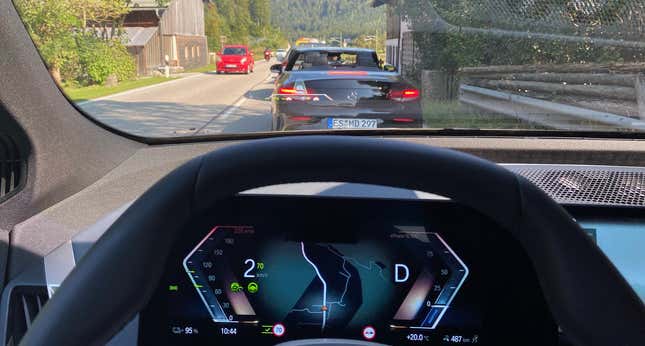
The goals of driving the BMW iX are a bit different than what one normally associates with BMWs; this is not so much a car that you’re going to use to carve canyons and whip around, imagining that you’ll take it to the track one day. That’s not to say it’s not been capably designed and engineered to drive well, but the goal of this thing is comfort and speed as opposed to raw driving excitement.
It’s also a tall, heavy SUV, and there’s just no getting around the physics of that.
That said, for what this machine is designed to do, it’s quite good. It feels fast, and, like all EVs, that torque is instant and satisfying, and the acceleration is great.
On the autobahn, at speeds of 130 to 140 mph, the iX is a speedy, silent mobile room. The wheels have been designed to be especially aerodynamic and quiet, and as a result there’s pretty minimal road noise.
To keep things from being too masoleum-quiet, there’s artificial sounds that get played, and they’re actually and maybe a little surprisingly good. BMW got musician Hans Zimmer to come up with a bunch of EV sounds, and I found that they provided valuable feedback about throttle position and enhanced the overall experience without seeming forced or too artificial. It’s well-executed.
The suspension is double wishbone up front and multi-link at the rear, and it held the road very well; I’m not sure of the exact weight, but it has to be pushing 5,000 pounds, and the impressive thing is that you’re not constantly reminded of that.
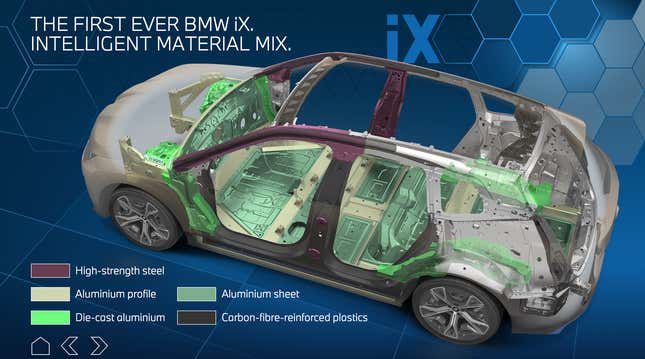
I know effort was spent to try to keep the weight down, including using a lot of structural carbon fiber, something that BMW learned a lot about when it was building i3s.
The iX is fast, handles confidently, and is extremely comfortable to drive. I think that’s what buyers in this segment want.
Not Being Terrible
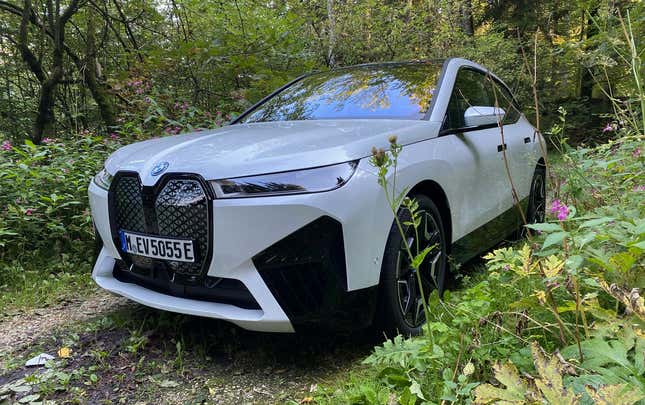
BMW made a point to tell us all the ways it was trying to make the building and use of the iX have as minimal an environmental impact as possible, and I do think the company is trying.
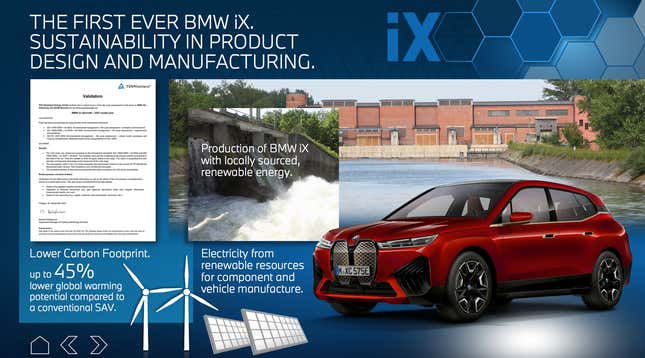
BMW claims to be using local, renewable energy for the manufacturing of the iX, amounting to a 45 percent smaller carbon footprint.
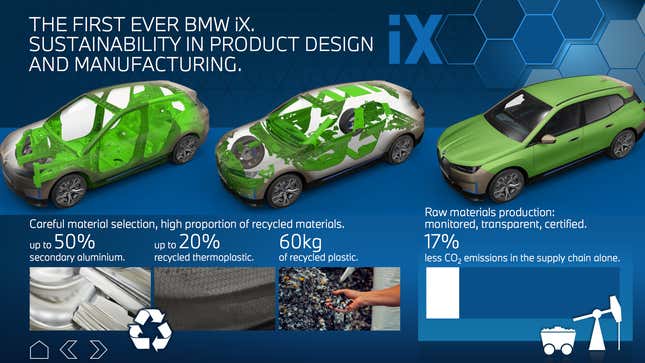
The material chosen and used for the iX incorporates a lot of recycled material — aluminum, thermoplastics, and regular plastics. I don’t have the means to verify any of these claims, but it’s still great to see companies planning to make vehicles more environmentally responsible from the get-go.
The Verdict
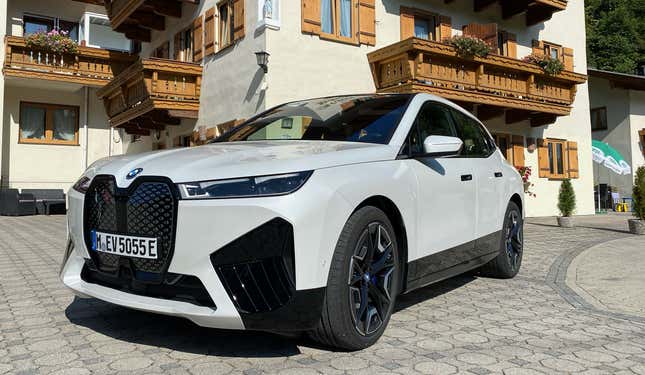
Honestly? I think BMW has a winner here. For people looking to spend over $80 grand on a large, all-electric, very premium SUV, there’s going to be the comparison between iX and the Tesla Model X.
While I think the Tesla has some significant packaging and tech advantages over the BMW, the build quality and interior design of the BMW are significantly better than those of the Model X. Plus, the BMW is not saddled with a stupid, gimmicky yoke steering wheel, and it will likely offer a better service and support experience.
The Model X is tough competition, as are up-and-coming offerings from Volvo, Audi, and others. But BMW has a very capable player in the premium electric SUV arena, and I bet we’ll end up seeing a lot of these things on the road.
So you better get used to that face.